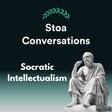
7 Stoic Habits You Can Start Today (Episode 178)
Living like a Stoic is about getting the little things right. In this episode, Michael Tremblay discusses 7 Stoic habits you can start today to build a more thoughtful, resilient, and Stoic you.
(01:25) Thinking Well
(14:24) Living Philosophically
(17:58) Preparing for Adversity
(30:15) Summary
***
Subscribe to The Stoa Letter for weekly meditations, actions, and links to the best Stoic resources: www.stoaletter.com/subscribe
Download the Stoa app (it’s a free download): https://stoameditation.com/pod
If you try the Stoa app and find it useful, but truly cannot afford it, email us and we'll set you up with a free account.
Listen to more episodes and learn more here: https://stoameditation.com/blog/stoa-conversations/
Thanks to Michael Levy for graciously letting us use his music in the conversations: https://ancientlyre.com/



















